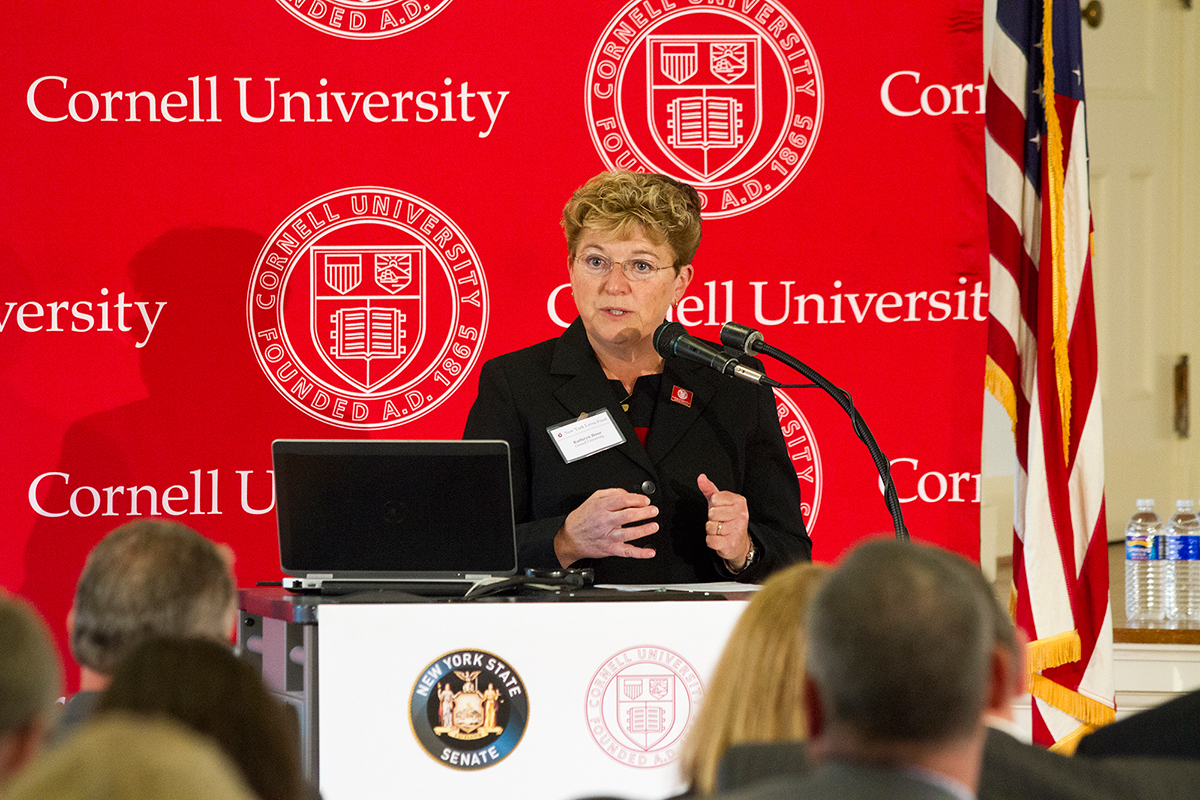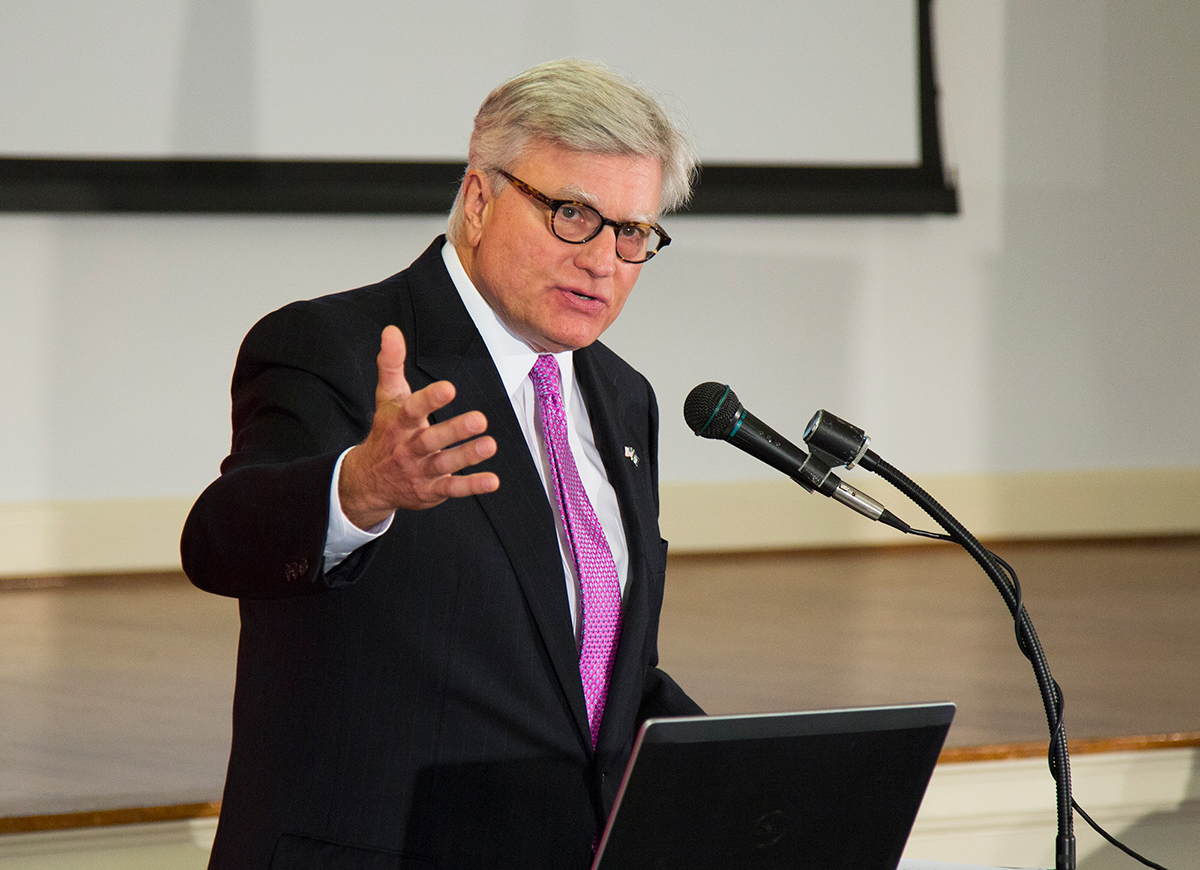Ag experts agree 'NY Loves Food' at Oct. 14 event
By Matt Hayes



Innovation has long been a hallmark of the New York agricultural industry, helping to introduce products to market and driving growth in the upstate economy. Now, farming and food processor leaders, backed by Cornell University research and know-how, envision a new era of sustained growth as favorable consumer tastes and a changing climate open opportunities across the Empire State.
A spirit of growth and innovation animated talks throughout “New York Loves Food” Oct. 14 at Cornell’s New York State Agricultural Experiment Station (NYSAES) in Geneva, New York. The summit, hosted by state Sen. Michael Nozzolio ’77, R-54th Dist., gathered growers, food processors, state officials, legislators and experts from the College of Agriculture and Life Sciences (CALS) to discuss shared interests vital to a dynamic New York agricultural sector.
Business leaders from Seneca Foods, Wegmans Food Markets, Anheuser Busch, Cheribundi, Constellation Brands and others took part in discussions on the challenges and opportunities facing the industry.
Brian Nicholson, owner of Red Jacket Orchards, said farmers have always had a strand of innovativeness that he considered fundamental to American ingenuity.
“The entrepreneurial spirit that is the basis of agriculture, it’s really a part of America,” said Nicholson. “We are proud to be a part of that.”
Founded in 1949 as a farm operation growing apples, family-owned Red Jacket Orchards has evolved over the last few years into a branded company specializing in premium fruits and cold-pressed juices. Nicholson credited the support of Cornell and its New York State Food Venture Center as critical to the success of the Geneva-based company as it has expanded into value-added products. He said he expects sales to triple in the coming years as Red Jacket Orchards expands distribution across the country.
That sense of optimism was palpable throughout the conference.
“Timing is everything, and we are at the cusp of greater growth,” Nozzolio said of opportunities available to growers in the region and throughout the state.
Nozzolio praised the support afforded by Cornell facilities, faculty and researchers as a boon to all in the agricultural sector. “Cornell is, I believe, the key to unlocking the great additional potential that exists for the development of food,” he said.
Kathryn J. Boor, the Ronald P. Lynch Dean of CALS, noted that food and agriculture contribute roughly $96 billion to the New York economy each year. That impact is felt through production, processing, value-added foods and beverages and by contributing to the profitability of affiliated industries, she said.
As persistent drought and climate change affects growers in California and other western growing states, Boor said New York has the potential to increase the share of its agricultural products sold throughout the region and the country.
“Certainly the fact that we over-rely on California’s ability to produce 50 percent of the nation’s fruits and vegetables should be a call to action for those of us on the east coast – like New York – who will have water,” she said.
She sees that water, along with abundant land and a growing season increasing in length, as an opportunity for New York growers, especially as technological advances make their way into fields and orchards.
“The future requires us to be more efficient. The future requires everyone – conventional and organic farmers – to embrace technology, precision agriculture and plant breeding at a time when many consumers are skeptical of science and technology in food production,” she said.
Kraig H. Kayser, MBA ’84, president and CEO of Seneca Foods, noted the rich soil, improving climate for agriculture and proximity to the New York City consumer market all position the state for growth.
Kayser said there are now hundreds of agricultural entrepreneurs, large and small, vying to take advantage of economic factors tilting in favor of New York growers and processors.
The dynamism of the market reminded Kayser of the entrepreneurial spirit exhibited by Seneca Foods founder Art Wolcott ’49, who pioneered juice evaporation to produce frozen concentrated Concord grape juice.
That company Wolcott started in 1958 has grown into one of the largest fruit and vegetable processors in North America, with 23 plants and $1.2 billion in revenue.
Kayser said that Cornell played a pivotal role in Wolcott’s early success, and that support has continued through partnerships with NYSAES. He credited breeding research undertaken at NYSAES and resources through the Food Venture Center as factors that facilitate growth for processors of all sizes.
“New York agriculture has entered a whole new exciting chapter, and we are writing a new history as we speak,” said Kayser, a Cornell trustee.
“This new era has brought attention to New York like it hasn’t seen in over 50 years,” he said.
Matt Hayes is managing editor and social media officer for the College of Agriculture and Life Sciences.
Media Contact
Get Cornell news delivered right to your inbox.
Subscribe